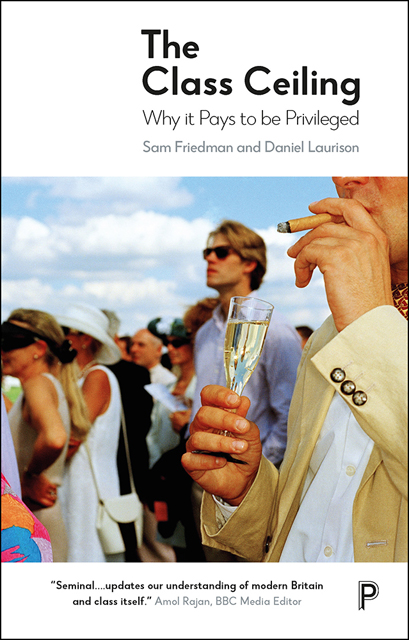Book contents
- Frontmatter
- Dedication
- Miscellaneous Frontmatter
- Contents
- List of figures and tables
- Acknowledgements
- Note on language usage
- Introduction
- one Getting in
- two Getting on
- three Untangling the class pay gap
- four Inside elite firms
- five The Bank of Mum and Dad
- six A helping hand
- seven Fitting in
- eight View from the top
- nine Self-elimination
- ten Class ceilings: A new approach to social mobility
- eleven Conclusion
- Epilogue: 10 ways to break the class ceiling
- Methodological appendix
- Notes
- References
- Index
eleven - Conclusion
Published online by Cambridge University Press: 14 April 2023
- Frontmatter
- Dedication
- Miscellaneous Frontmatter
- Contents
- List of figures and tables
- Acknowledgements
- Note on language usage
- Introduction
- one Getting in
- two Getting on
- three Untangling the class pay gap
- four Inside elite firms
- five The Bank of Mum and Dad
- six A helping hand
- seven Fitting in
- eight View from the top
- nine Self-elimination
- ten Class ceilings: A new approach to social mobility
- eleven Conclusion
- Epilogue: 10 ways to break the class ceiling
- Methodological appendix
- Notes
- References
- Index
Summary
In contemporary Britain it quite literally pays to be privileged. Even when individuals from working-class backgrounds are successful in entering the country’s elite occupations they go on to earn, on average, 16% less than colleagues from more privileged backgrounds. And more significantly, this class pay gap is not explained away by conventional indicators of ‘merit’. A substantial gap remains even when we take into account a person’s educational credentials, the hours they work and their level of training and experience.
In many ways this one relatively simple finding constitutes the central contribution of this book. We tend to assume that people get ahead in their careers on the basis of their own individual skill, experience and effort. These principles, both morally and pragmatically, underpin Britain’s ‘meritocratic ideal’, and have long dominated discussions about economic growth and social mobility. Yet the existence of a ‘class pay gap’ provides a sobering corrective to this lofty aim. When even institutions like Oxford and Cambridge, widely championed as the ultimate meritocratic sorting houses, do not wash away the advantages of class background, as we show emphatically in Chapter Three, this surely constitutes a stark rejoinder to even the most strident believers in Britain’s meritocracy. The class pay gap, in other words, reveals a powerful and previously unobserved axis of inequality that clearly demands urgent attention.
Still, we always wanted to do more than just diagnose a problem. In this way, most of this book has been devoted to unravelling the drivers of the class pay gap, the mechanisms that explain precisely why the upwardly socially mobile, even when they are as ‘meritorious’ as their privileged colleagues (in every way we can measure), still fail to progress equally. One theme, in particular, runs throughout our analysis. This relates to the idea of ‘merit’ itself. We would not dispute that conventional measures of ‘merit’ – skills, qualifications, expertise, effort, experience – are important to career progression in Britain’s elite occupations. But what our analysis indicates is that people do not necessarily have an equal capacity to ‘cash in’ their ‘merit’ or ‘realise’ their talent. This is because for ‘merit’ to land it has to be given the opportunity to be demonstrated, it has to be performed in a way that aligns with dominant ideas about the ‘right’ way to work, and it has to be recognised as valuable by those holding the keys to progression.
- Type
- Chapter
- Information
- The Class CeilingWhy It Pays to Be Privileged, pp. 209 - 228Publisher: Bristol University PressPrint publication year: 2019



